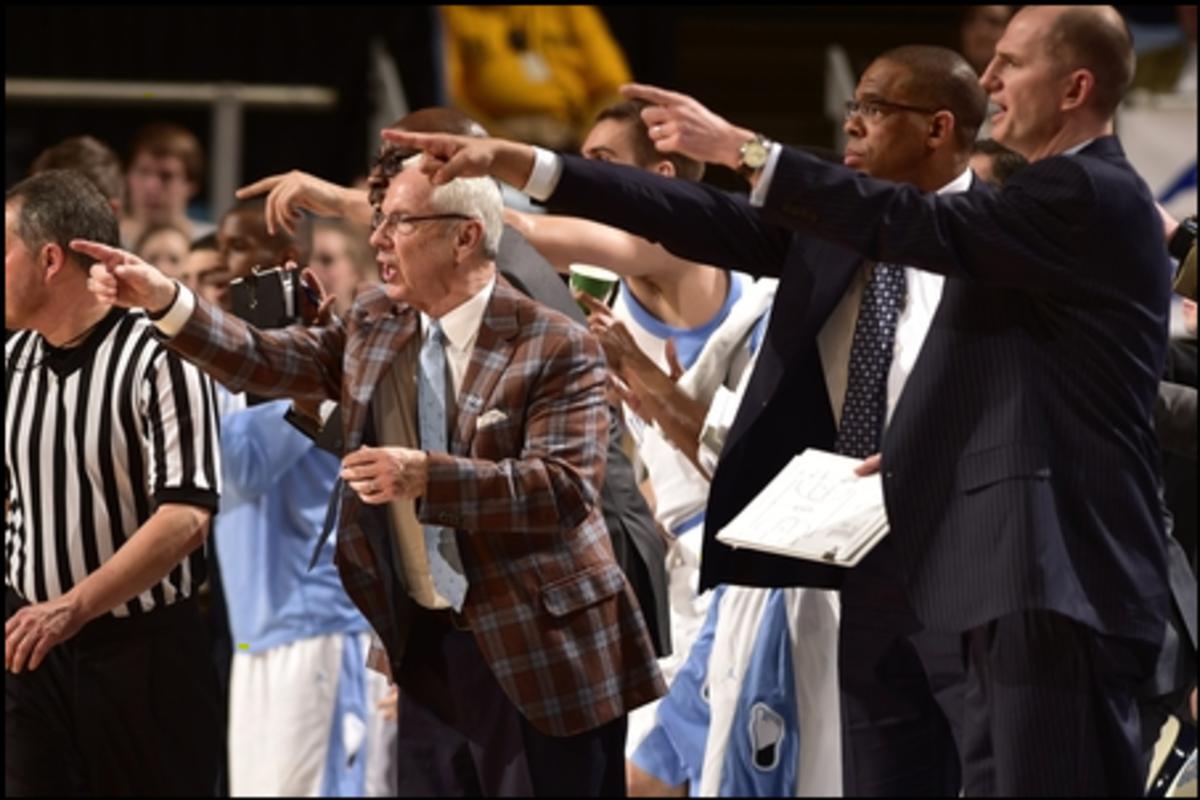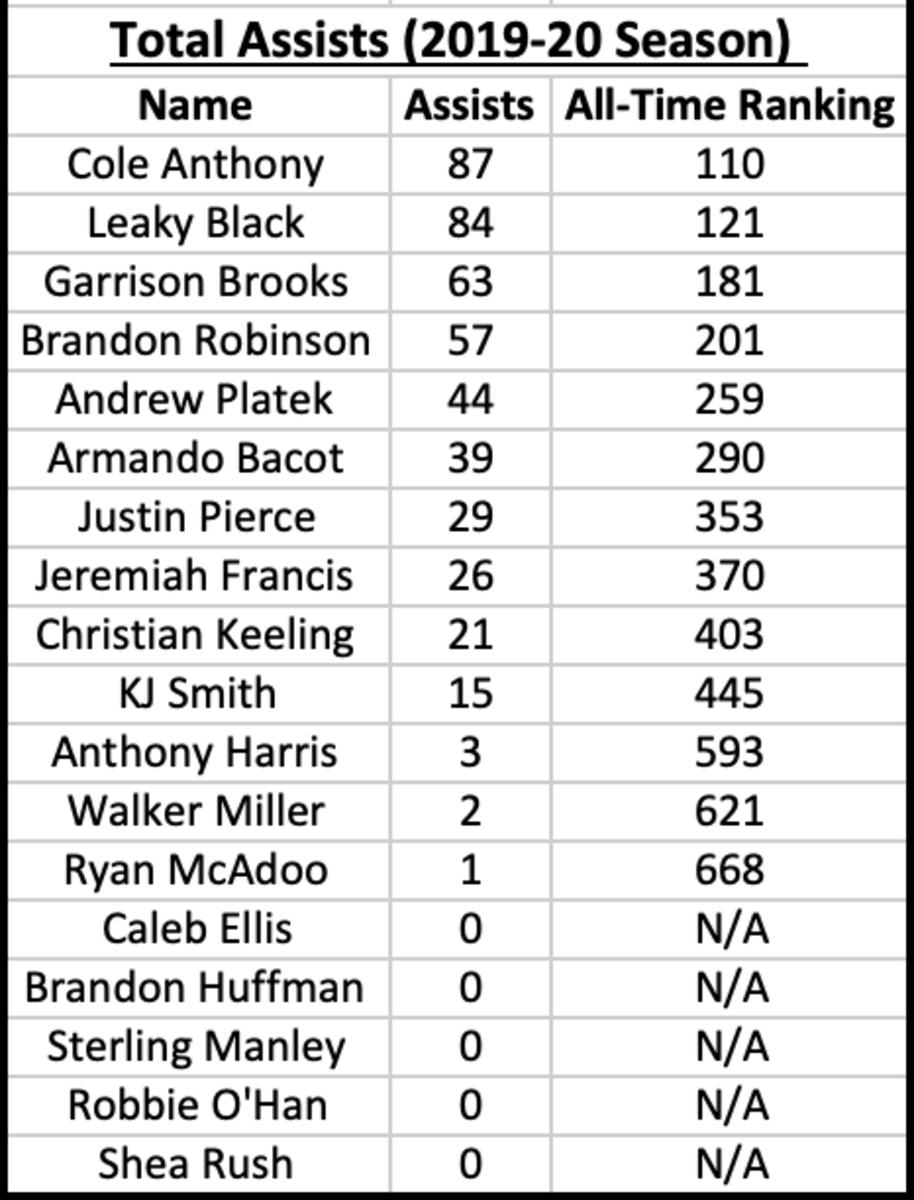UNC Basketball: 2019-20 Stats in Review - Total Assists
“Don’t point!”
“Stop pointing, it’s rude!”
“When you point at someone, there are three fingers pointing back at you.”
As a grown man, these clichés from authority figures in my life still ring painfully in my ears. Pointing is bad. I get it. I need to stop doing it.
In most contexts it is indeed rude to point. Such is not the case on Roy Williams Court within the Dean E. Smith Center, where pointing is not only acceptable but expected.
Well that certainly seems socially unacceptable and not politically correct, doesn’t it? Not in the house that Dean Smith built. Let Coach Smith explain in his own words.
“I was so tired of the star always being the one who scored the most points. I wanted to reward the passer. We started, any game, and in practice, if I scored, I’d turn and thank the guy that gave me the pass. Our players picked it up, and the coaches did it, and the next thing you know, our fans would start pointing to the passers. It made guys anxious to pass after a while. We called it the ‘Bobby Jones Rule’, because he once pointed to the passer after he’d gotten a good pass and missed the lay-up.”
Want some video proof?
Ranzino Smith pointing to Jeff Lebo after a go-ahead bucket against Syracuse:
Lebo
— chris (@dadgumboxscores) February 29, 2020
Ranzino
backdoor bucket for the lead#CarolinaFamily pic.twitter.com/93Q1p6JcgB
Caleb Ellis pointing to KJ Smith last year against Louisville:
KJ Smith to Caleb Ellis
— chris (@dadgumboxscores) February 23, 2020
Point to the passer pic.twitter.com/TA7UssUVtQ
Garrison Brooks pointing to Brandon Robinson after a sweet entry pass against Virginia Tech:
Few things are more beautiful than a Brandon Robinson entry pass.
— Trevor William Marks (@twmarks_) March 11, 2020
Point to the passer. #UNC pic.twitter.com/RKMNscsTGR
And, of course, Michael Jordan pointing to Scottie Pippen in a Bulls game:
Coach Dean Smith at UNC taught his players to point their finger at the assisting passer after a basket, reinforcing the idea of teamwork and to acknowledge the selflessness. #TheLastDance pic.twitter.com/W6byv91Bxo
— SpreadOffense.com (@SpreadOffense) April 20, 2020
So you see, eventually this idea of pointing to the passer to reward him for selfless play became part of the Carolina ethos. Assists are a foundational part of the Carolina way of doing things. It started with Dean Smith and carries on today with Roy Williams and his staff.

Over the course of the next several weeks, I’ll be reviewing the stats from the 2019-20 North Carolina basketball team, one category at a time. We began last week by looking at total points and earlier this week discussed total rebounds. We move today to total assists.
As a reminder: while these stats won’t tell the whole story of the season, they will help provide context and insight for both the present and historical context.
The following chart will list each player, how many assists they had, and where they ranked in the Carolina history books for total assists in a single season.

Observations
- The leading assist man on this team was Cole Anthony, with 87 assists, good for 110th all-time in a single season at Carolina. Never before in the Roy Williams era has the leading assist man had under 100 assists.
- The last time the leading assist man had under 100 was in 2001-02 (the 8-20 season in which Adam Boone had 89). Prior to that it hadn’t happened since 1978-79 (although Mike O’Koren had 99). The only two other instances in Carolina history were 1969-70 (Eddie Fogler – 92) and 1970-71 (Steve Previs – 90).*
- That means that just five times in Carolina history has the leading assist man finished with under 100 assists.*
- Furthermore, only twice in Carolina history has the leading assist man finished with fewer than 90 assists – 2001-02 and 2019-20.*
- To top it off - since assists were first consistently recorded in Carolina's record book in 1968-69, Cole Anthony's 87 team-leading assists are the fewest in Tar Heel HISTORY for the team leader.*
- This was the first season since 2011-12 to not have multiple players with 100+ assists. Kendall Marshall had 351 that season, so there weren’t very many others to go around.
- Incidentally, Marshall’s 351 assists are the most ever in a season for a Tar Heel (Ed Cota is second with 284 in 1999-00, 67 behind Marshall), the most ever in a season in the ACC, and the fourth most in a season for all of NCAA Division 1.
- Leaky Black had the most assists in a single game this season – nine against Duke in Chapel Hill (a game that we shall not speak about anymore).
- Carolina had 471 assists as a team. That’s the lowest number since 462 in 1979-80. It’s the fourth-fewest team assists for Carolina, better than only aforementioned 1979-80 and 1978-79 (428), 1969-70 (403).
*For reference, assists were first consistently recorded in the Carolina record book in 1968-69. There was one previous outlier in 1958-59, a season with just 25 games, so was not included in the conversation above.
Conclusions
Once again, numbers don’t tell the whole story, but they do help tell the story. So what story do these numbers help tell?
First off, it’s important to keep in mind that these lower rebound totals are, in part, due to the fewer number of games played in 2019-20 (no postseason). Also, several of these lower point totals are due to games missed as a result of injury (Cole Anthony, for example).
Although the numbers were low, Carolina does return two of their top three assisters (Leaky Black, Garrison Brooks) and four of the top six (add Andrew Platek and Armando Bacot). Leaky Black, in particular has a chance to really flourish as a passer because of his positional height and wingspan (think Theo Pinson).
None of the incoming freshmen (Caleb Love or RJ Davis) are known as pass-first guards in a Kendall Marshall-mold, so it looks to be another “assist-by-committee” type of year.
There wasn’t enough finger-pointing on the 2019-20 Tar Heels. Here’s to hoping we all have the opportunity to be a little bit ruder in 2020-21.
Next stat to investigate on Tuesday, May 26: Three-pointers.
You can follow us for future coverage by clicking "Follow" on the top righthand corner of the page.
Follow us on Twitter: @UNConMaven | @isaacschade
Please post any comments below!
